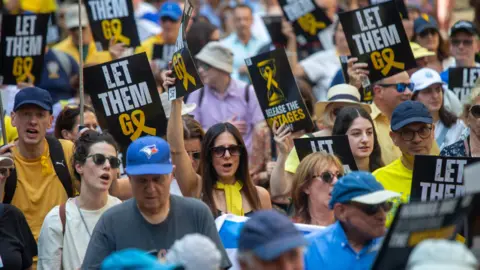On a recent Sunday afternoon, London’s streets filled with vibrant colors as hundreds of demonstrators gathered for a pro-Israel march. The primary objective of the rally was to voice support for Israel and advocate for the release of hostages who are believed to be held in Gaza. Demonstrators carried Israeli flags and placards depicting the faces of hostages, generating a significant presence in the heart of the city.
Notable among the participants was Chief Rabbi Ephraim Mirvis, who lent his influential voice to the cause. The demonstration was organized by Stop The Hate, a direct action group dedicated to advocating against antisemitism and promoting support for Israel. The atmosphere throughout the demonstration was passionate and charged, with speakers expressing their concerns about the UK government’s approach towards recognizing a Palestinian state in September. Many demonstrators viewed this potential recognition as a reward for Hamas, the organization responsible for the October 7 attacks that initiated current unrest.
Encounters between opposing groups briefly disrupted the event, particularly near the iconic Trafalgar Square, where some individuals chanted pro-Palestinian slogans. Police intervened, escorting a few people away from the escalating tensions. One person was arrested during the event for common assault and related offenses, signifying the underlying volatility surrounding the ongoing conflict.
Among the marchers, Adam Ma’anit stood out, a man deeply affected by the tragedy of the situation. He detailed the profound loss endured by his family due to the attacks, sharing his perspective on the inadequacies of the British government’s efforts to secure the hostages’ release. Ma’anit emphasized the urgency of securing freedom for the hostages, remarking that doing so could open new avenues for dialogue and resolution concerning the broader Middle Eastern crisis. He criticized the government for what he called a “bungled” response to international dynamics, asserting that their actions had inadvertently granted Hamas a sense of victory.
The plight of those still held captive resonated strongly among the participants. Approximately 20 of the estimated 50 hostages are believed to be alive, heightening the pressure on the UK government and prompting voices like Julie’s – a participant who refrained from providing her last name – to insist on a collective effort to remember and act for their return.
Further complicating the political landscape, Sir Keir Starmer, the UK opposition leader, announced that the government would recognize a Palestinian state unless Israel took substantive steps to ameliorate the deteriorating humanitarian situation in Gaza. Starmer recalled a commitment for Israel to allow humanitarian aid and reach a ceasefire, presenting an opportunity for a long-term two-state solution. However, many protesters retorted that Starmer’s focus should be on the release of the hostages, pointing out the urgency of their predicament, contrasting it against broader political maneuvers.
The atmosphere at the march was punctuated by significant security measures, including visible police presence and Jewish safety groups ensuring the event’s peaceful progression. Despite the organized setting, there were underlying tensions as many attendees voiced concerns over increasing antisemitism in the UK, particularly heightened since the tragic events of October 7, when a surge in violence resulted in the deaths of around 1,200 people in Israel and the hostage-taking of over 250 individuals.
The gravity of the situation cannot be overstated; since those attacks, the health ministry in Gaza has reported an alarming death toll, estimating 61,430 casualties due to Israeli military operations. The complexities of the ongoing conflict pose challenges not only on the battlefield but also in the sphere of public opinion, safety for communities, and diplomatic relations.
This pro-Israel demonstration is a manifestation of the heightened sensitivity surrounding this enduring conflict, demonstrating the intricate web of emotions, fears, and hopes that permeate public discourse in the UK regarding Israel and Palestine. The call for unity among the Jewish community and their allies reflects a poignant reminder of the human cost of conflict, while the actions of the government continue to stir significant debate on the international stage.











